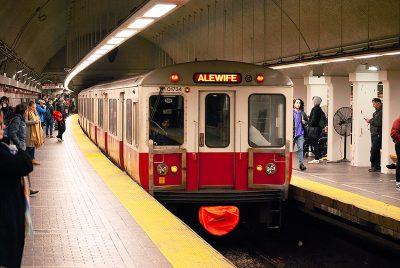
The MBTA’s Red Line will suspend service between Broadway and MIT/Kendall stations for four weekends, beginning this Friday, according to the MBTA.
The renovations will take place between Nov. 15 and Dec. 15 to facilitate the renovations outlined in the MBTA’s 2019 Capital Acceleration Plan. Service will be suspended four out of the five weekends during this time period, with construction taking a break the weekend after Thanksgiving.
The weekend suspensions will begin at 8:45 p.m. on Fridays, with shuttle buses replacing subway service between Broadway and MIT/Kendall stations, according to the MBTA. Service will resume Monday mornings.
The MBTA is suspending Red Line service throughout the entirety of Downtown Boston in an effort to hasten station, vehicle, and infrastructure improvements that will transform the T into a “modern, safe, reliable public transport system,” according to the MBTA’s website.
Jarred Johnson, chief operating officer of Transit Matters, a non-profit advocacy group pushing for better access to public transportation in the Greater Boston Area, said he supports the MBTA’s decision to complete the Red Line improvements over the upcoming weekends, rather than further down the line.
“This is work that they’re going to be able to do in four weekends instead of what might otherwise take them half a year, and you know it will see increased train speeds and more reliability out of it,” Johnson said. “This weekend work is a shorter-term pain versus if the project gets drawn out.”
Stacy Thompson, executive director of transportation advocacy group Livable Streets Alliance, wrote in an email that the upcoming Red Line improvements are long overdue.
“We’ve allowed our stations, T vehicles and overall infrastructure to fall into disrepair,” Thompson wrote, “we simply can’t delay these very necessary improvements.”
Specifically, repair crews will maintain track quality and improve power quality between stations, clean tunnels of debris, conduct detailed inspections of the Red Line’s infrastructure and improve stations by repairing and maintaining platforms, escalators, elevators, stairs and fare equipment, according to the MBTA’s website.
To account for delays, Thompson wrote in an email riders should allocate more time for transportation during these weekends because the shuttle bus system is not as advanced as the T.
“The shuttle system will operate differently than the T,” Thompson wrote, “and will likely move people a little more slowly, but it will still get you where you need to go.”
Johnson said his organization has pushed for the MBTA to improve its other public transportation systems as well as to offset the delays caused by the Red Line construction.
“One of the things that we have kind of pushed for was making sure that the shuttles work well,” Johnson said, “and that there are plenty of options to mitigate that.”
Beyond the shuttle bus, Jarred said there are other modes of transportation that can be utilized to replace the Red Line, such as Bluebikes and the commuter rail.
“For those who are mobile enough to use a bike, that’s a great option,” Johnson said. “In a lot of cases, [the commuter rail] actually parallels the lines that have been shut down.”
The MBTA is shutting down the Red Line as part of its 2019 Capital Acceleration Plan, which hopes to accelerate the pace of the improvements outlined in its five-year, $8 billion Capital Investment Plan, according to its website.
To accommodate the hastened deadline, the MBTA is shutting down parts of the Orange, Red and Green Lines for various weekends throughout the latter half of 2019, according to its website.
The MBTA recently finished repairing the section of the Orange Line that services Downtown Boston, during which the MBTA suspended service between Tufts Medical Center and Sullivan Square for six weekends between October and November.
As a result, station improvements and track replacements at the Red Line’s Park Street station will be completed four months earlier than originally planned, while construction on the Orange Line’s Downtown Crossing station will be complete 11 months ahead of schedule, according to the MBTA’s website.
Ceasing Red Line service between Kendall/MIT and Broadway stations is necessary to facilitate repairs for vehicles and equipment in the railway tunnels, according to the MBTA’s website.
Nancy Wichmann, 70, of Waltham said although she owns a car, she still recognizes the importance of investing in public transportation to remove cars from the road.
“They want to reduce carbon emissions in Boston,” Wichmann said, “and this would be a big help doing that.”
Eric Newman, 28, of Downtown Boston, said it’s inevitable for the City of Boston to invest in public transportation because the T system has many fundamental problems.
“[The MBTA] just addresses very simple things that can be done quickly because it takes so long to redo much of the track, but they have to invest or there’s always going to continue to be problems,” Newman said. “Some form of continuing to spend in repair is necessary.”
Eliza Gagnon, 56, of Chelsea said although she travels by car or scooter in addition to the train, the T is essential to the people of Boston and deserves to be heavily invested in.
“I don’t see how a city can function without good public transportation,” Gagnon said. “Because of gentrification, people are being driven farther and farther out of the city and they don’t have access to good public transportation and it’s a serious health issue, ultimately.”






















































































































